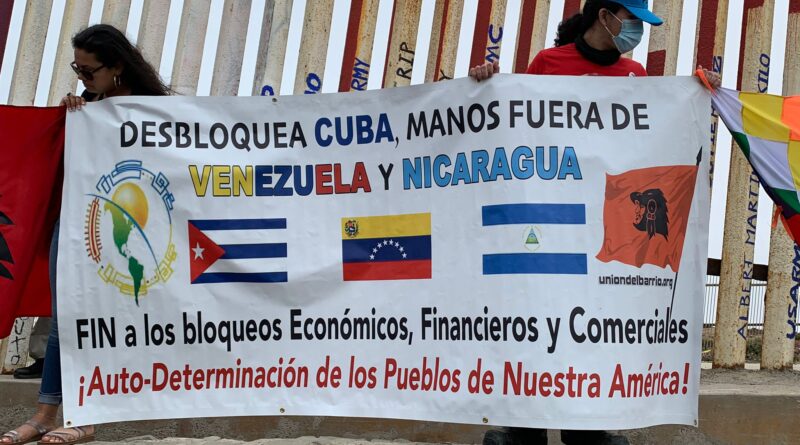“Summit of Exclusion” Backfires on Biden
Jill Clark-Gollub, Washington DC
Alina Duarte, Mexico
John Perry, Nicaragua
“We would definitely have wanted a different Summit of the Americas. The silence of those absent challenges us. So that this does not happen again, I would like to state for the future that the fact of being the host country of the Summit does not grant the capacity to impose a ‘right of admission’ on the member countries of the continent.” President of Argentina and president pro tempore of the Community of Latin American and Caribbean Countries (CELAC), Alberto Fernández, at the Summit of the Americas, June 10, 2022, Los Angeles.
While hosting the Ninth Summit of the Americas in Los Angeles last week, the Biden administration sought to ostracize Cuba, Nicaragua, and Venezuela by excluding them due to an alleged “lack of democratic space and human rights situations”. The resulting backlash caused these three countries to be the most discussed topic inside and outside the summit venue, as governments and social movements in Latin America and the Caribbean questioned whether the United States has the right or moral authority to pass judgment on the form of government each nation chooses. There was also plenty of skepticism about whether the Organization of American States (OAS), which has served as an instrument for advancing US hegemony in the region, really promotes the interests of the countries of the hemisphere. American scholar and activist Cornel West called this “a Malcolm X moment” in which the chickens are coming home to roost.[1] How did we get here?
Sanctioning itself out of business
The United States has targeted Cuba, Nicaragua, and Venezuela for regime change, particularly through economic warfare in the form of unilateral coercive measures, commonly called sanctions. The U.S. now wields illegal sanctions on over a third of humanity living in 42 countries.[2] This blunt instrument seeks to push a nation’s population to revolt against its government, and sanctions were stepped up against Venezuela even during the time of pandemic. Though the tactic rarely succeeds, as the Cuban, Nicaraguan, and Venezuelan people know, sanctions impact the poorest and most vulnerable citizens, particularly children, and cause thousands of deaths, in contravention of the Charters of the United Nations and the OAS. Consequently, sanctioned countries have been looking for ways around the U.S. dollar-dominated banking system. They were further pushed towards this when the U.S. undermined that very system by confiscating the gold and foreign reserves of Venezuela, then Afghanistan, and now Russia, as economist Michael Hudson has explained.[3]
The Biden administration should have realized by now that nations are no longer blindly following its orders to isolate countries it seeks to punish. For example, although corporate media depict a world united against Russia since February 24 of this year, a vast majority of countries in Asia, Africa, and Latin America (in this case representing the majority of humanity), have refused to impose sanctions on Russia.[4] And when it comes to following Washington’s dictates on voting at the U.N., the picture is not as black and white as it is painted in the global North.
In the recent U.N. General Assembly vote about Russia’s membership in the Human Rights Council—a campaign led by the U.S.—although 92 countries followed Uncle Sam’s lead, 82 countries (including giants such as India, China, Brazil, and South Africa) either abstained or voted against the U.S. initiative. They clearly represent the overwhelming majority of humanity, and actually include 13 countries in the Americas.[5] Of course, the strongest precedent for rejection of U.S. policy has been 29 years of near-unanimous annual votes in the U.N. General Assembly demanding the lifting of the criminal U.S. blockade on Cuba.
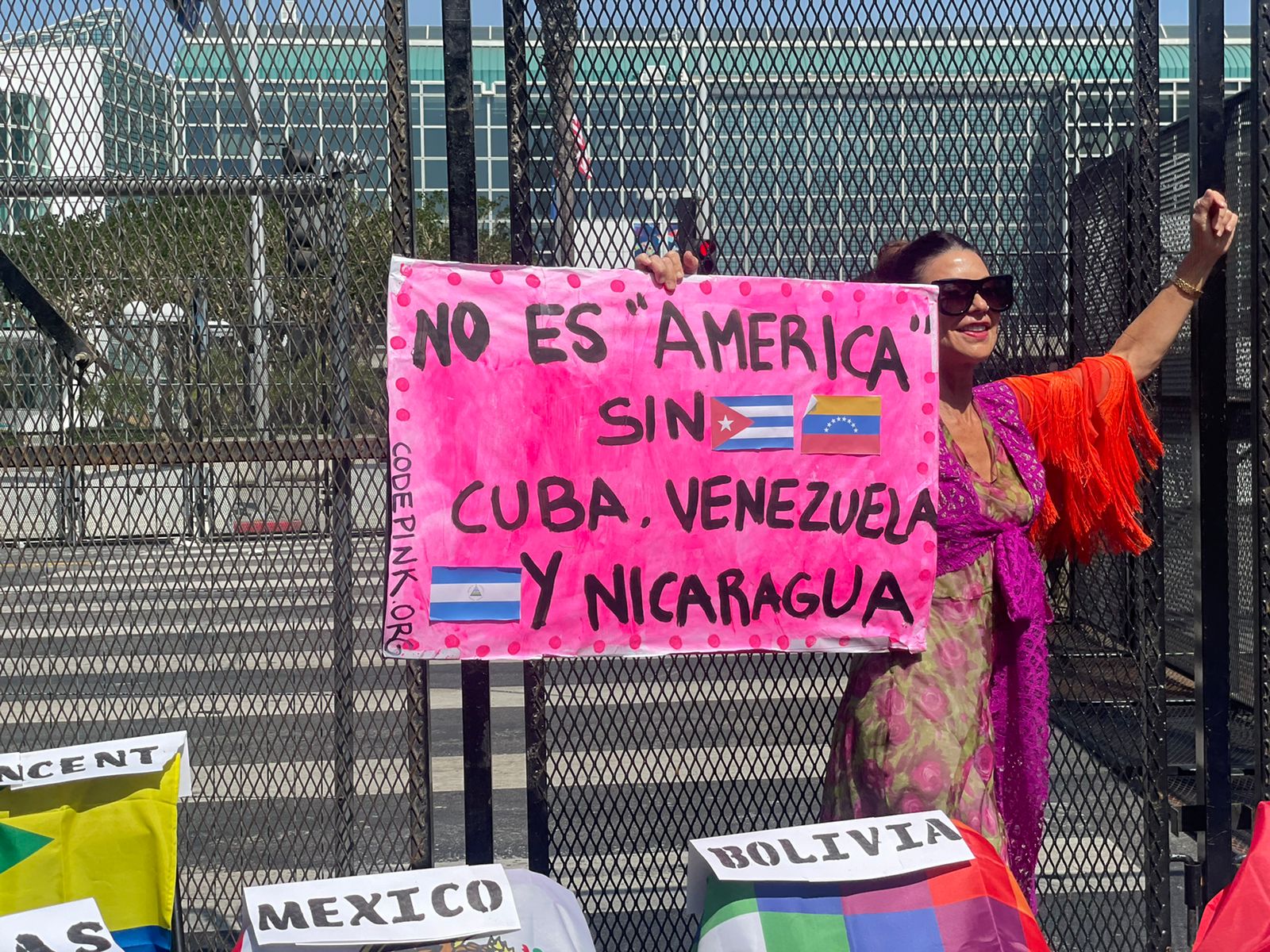
Governments reject U.S. arrogance
The exclusion of Venezuela, Nicaragua, and Cuba from the Summit of the Americas caused several heads of state to boycott the summit, with Mexican President Andrés Manuel López Obrador leading the way by saying that the selective invitations showed “disrespect of countries’ sovereignty and independence”. The presidents of Bolivia, Honduras, Guatemala, and St. Vincent and the Grenadines followed his example, while El Salvador and Uruguay stayed away for their own reasons. During the June 6-10 gathering, diplomats representing several governments used the podium to denounce the exclusion of the three countries and called for an end to sanctions, especially the blockade on Cuba. They also questioned whether any country has the right to judge the democracy of other nations, and called for a revamping of the OAS as an inter-American institution. These remarks were echoed by the heads of state of Belize, Argentina, Chile, and several CARICOM countries. It is as if Washington were unaware that there has been a second emancipation underway in Latin America for more than two decades, and that U.S. efforts to turn back the clock on the advance of regional independence and the diversification of trading partners only serve to further undermine its waning influence in the region.
Immigration resolution, in the absence of key nations
News reports after the Summit of the Americas ended questioned the validity of what is purported to be the Biden administration’s greatest accomplishment during the gathering—a declaration on migration —because it was discussed in the absence of the leaders of Mexico, Guatemala, El Salvador, and Honduras, the main sources of migration to the U.S. in recent years.[6] It is in any case an extremely paltry initiative that is unlikely to have any significant effect on numbers heading north.
The Summit took place during the trial of former Bolivian President Jeanine Áñez, who seized power after an OAS facilitated a coup d’etat in Bolivia in 2019, a fact not lost on many of the attendees, including the Bolivian representative. It was also raised by members of the audience during the Summit’s sessions, including Walter Smolarek who managed to speak from the floor for several minutes calling out OAS Secretary General Luis Almagro for his complicity in the massacres at Sacaba and Senkata during the Bolivian coup, and leaving Almagro almost speechless. Journalist Eugene Puryear pointed out the hypocrisy of the U.S. in shunning leaders it disagrees with while welcoming others, such as Ariel Henry of Haiti, who is accused by the judge who oversaw the case of murdering his predecessor.[7] President of Colombia, Iván Duque, whose government appears unable to stop the ongoing massacres and assassinations of human rights defenders, community leaders, and ex-combatants of the FARC, was also invited to the summit. And during the same session in which Secretary of State Blinken tried to present his administration as a worthy example of journalistic freedom, independent journalist Abby Martin challenged such a characterization by asking about U.S. client states implicated in murders of journalists, such as Palestinian-U.S. citizen Shireen Abu Akleh at the hands of the Israeli Defense Forces.[8]
The Cubans, Nicaraguans, and Venezuelans Biden did invite
The administration did extend invitations to some people from the scorned countries to participate in the Summit’s Civil Society Dialogue. In the case of Cuba, Norges Rodríguez, a telecommunications specialist, and Yotuel, the Cuban rapper living in Spain who became famous on July 11, 2021 for his song “Patria y Vida,” were present. The latter was the subject of an extensive exposé about his ties to the National Endowment for Democracy (NED) and the United States Agency for International Development (USAID).[9] Mr. Rodríguez, for his part, bragged about bringing photos from last year’s protests in Cuba to be displayed at the Summit, and remarked that he was there to raise awareness about the threat posed by the three excluded governments.[10]
Some Nicaraguan opposition journalists affiliated with outlets that have received funding from the Chamorro Foundation, known to channel funding from USAID and the NED, were invited to the Summit of the Americas, including Lucía Pineda of “100% Noticias” and others from “Confidencial.”[11] Other invitees, such as Francisca Ramírez, who calls herself a “peasant leader” in the anti-canal movement, are part of the militant opposition to the government and is alleged to have been one of the architects of the violent roadblocks that paralyzed Nicaragua for three months during a bloody coup attempt in 2018.[12]
As for Venezuela, at least Washington realized that it was not prudent to impose its puppet Juan Guaidó on the summit, as he has become an embarrassment. But it did invite Guaidó’s former “ambassador” to the UK, Vanessa Neumann,[13] who is under investigation by the Venezuela’s Attorney General’s office for involvement in blocking Venezuela’s gold reserves held by the Bank of England.[14] She resigned as Juan Guaidó’s diplomatic envoy to the UK in December 2020, expressing concern that “The future of Guaidó’s leadership is not clear within the opposition.”[15]
Given that the Summit was supposed to work on topics such as “Health and Resilience,” “Our Green Future,” and “Accelerating the Transition to Clean Energy,” one might wonder whether inclusion of these civil society actors who benefit from U.S. funding is merely intended to give a veneer of legitimacy to the unilateral approaches of U.S. policy, while undermining true multilateralism. The fact that these individuals further Washington’s regime-change narratives is just icing on the cake.
The peoples of the Americas unite
Meanwhile, peace and justice activists held their own summits in Los Angeles (June 8 to 10) and in Tijuana, Mexico (June 10 to 12), calling for social justice, respect for national sovereignty, and international workers’ solidarity. Both Summits also called for the immediate release of Venezuelan diplomat Alex Saab, who is being detained by U.S. authorities in violation of the Vienna Convention of 1961, setting a dangerous precedent for diplomatic missions around the world.[16]
The People’s Summit
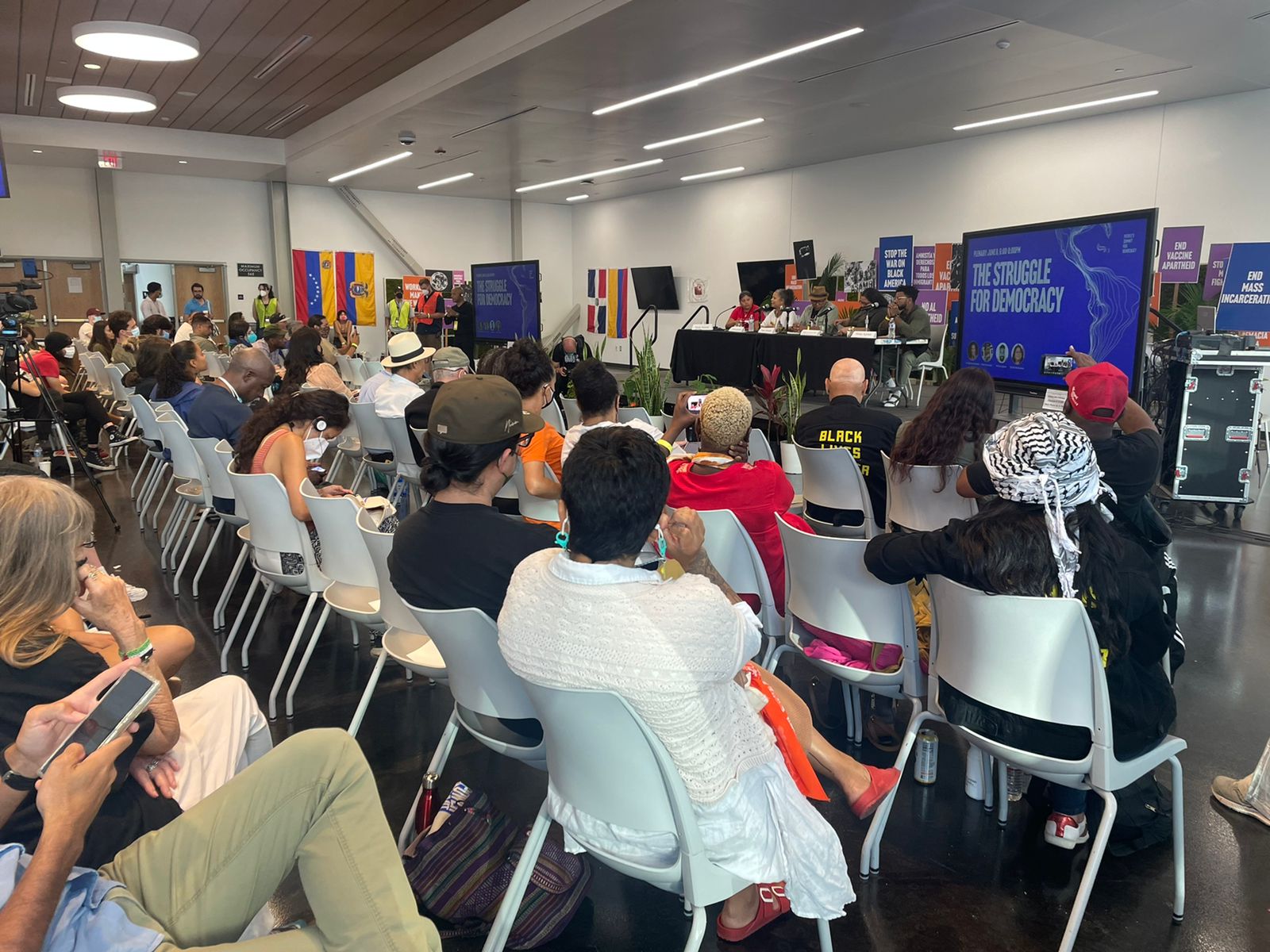
The People’s Summit for Democracy in Los Angeles, endorsed by over 250 grassroots organizations and attended in-person and on-line by thousands, had strong participation from tenants’ rights groups that criticized the U.S. government for staging its event in the city with the highest homelessness rate in the country.[17] The three-day event included teach-ins and protests with speeches denouncing the U.S. government hypocrisy of claiming to be a champion of democracy and human rights abroad while racism, poverty, voter suppression and an inequitable justice system afflict millions at home. Despite the LAPD’s refusal to grant a permit, the event culminated in a protest outside the Biden administration’s summit, prominently displaying the flags of Venezuela, Cuba, and Nicaragua. The final declaration of this alternative summit states:
“This Summit we have built together has been a bridge across organizations, movements, regions, languages, and borders. We are creating bonds between us and unity across our different struggles. While the time we have spent together is coming to a close, we affirm the ongoing fight for a more just world and rededicate ourselves to it.”[18]
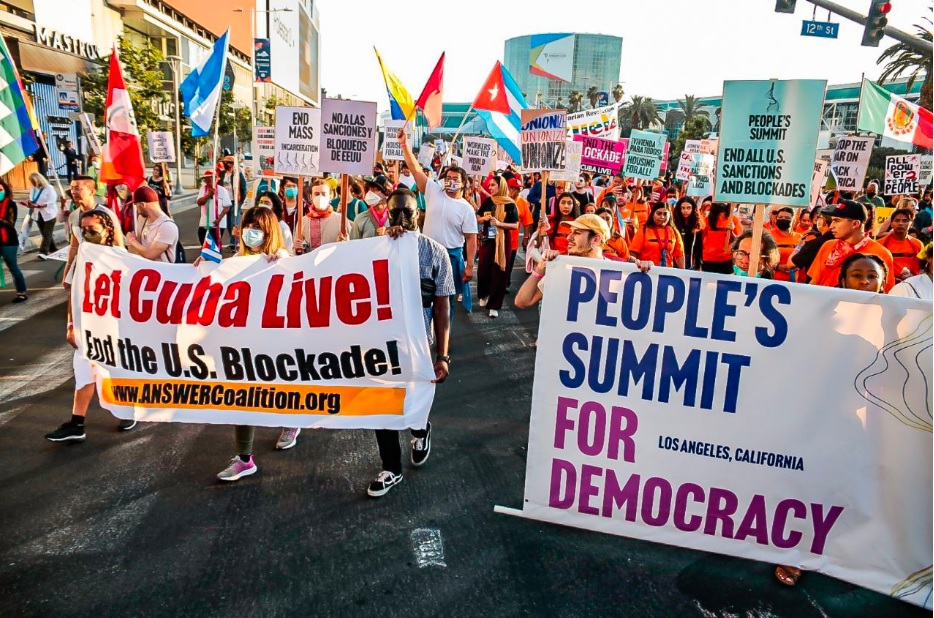
The People’s Summit ended up generating a situation contrary to the wishes of the Biden administration. On Friday, June 10, thousands walked the streets of Los Angeles demanding an end to the blockade against Cuba, as well as an end to economic warfare against Venezuela and Nicaragua. A massive mobilization that contrasted with the vacuum at the Summit of the Americas inside and outside the venue.
The Workers’ Summit
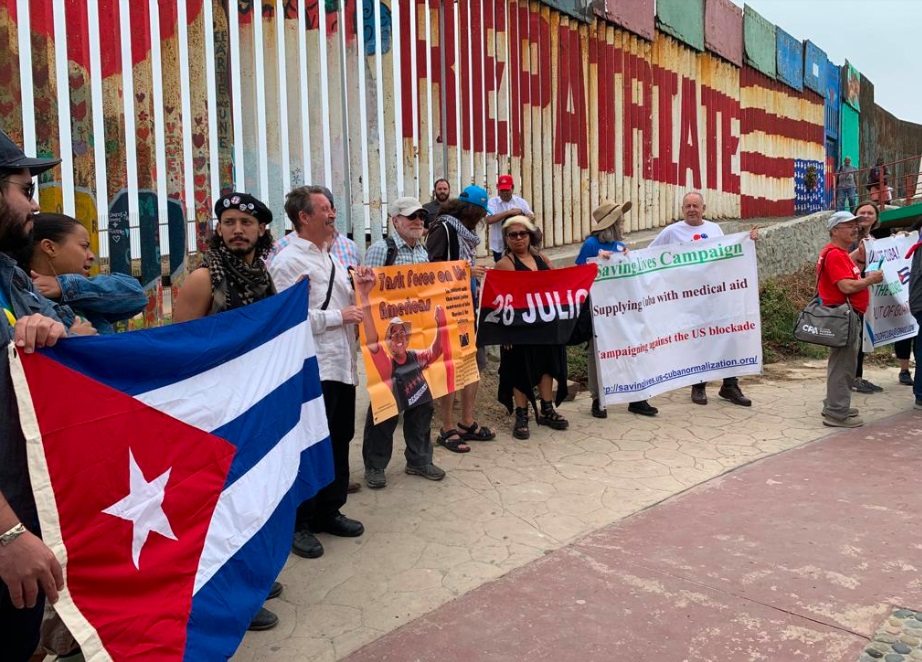
The Workers’ Summit in Tijuana also had extensive social movement and union participation, including in-person attendance by grassroots leaders from Cuba, Nicaragua, and Venezuela who were denied visas for the Los Angeles events. The peoples’ representatives of these three countries explained the advances their revolutionary societies have made in terms of housing for low-income people, socialized medicine, and free education through the highest level. There was a call to consolidate joint solidarity for the three countries against U.S. aggression, and to maintain ties among workers and social movements across national boundaries, in order to disseminate reliable information about what is happening in the different countries, take joint action when feasible, and learn from each other’s struggles. The final declaration of the workers summit states:
“We are witnessing a process of recolonization over the people. This is expressed in the excessive growth of racism, poverty, unemployment, job insecurity, environmental deterioration of territories, criminalization of migration, and gender and cultural violence. For this reason, we call upon the programmatic unity of the American continent’s workers, peasants, and progressive and popular forces to reflect, debate, and take concrete action to combat the labor and social violence applied to our peoples by the U.S. and Canadian governments.”[19]
The Summit proposes “To hold an annual meeting in Tijuana, Mexico, with the workers and social movements of the Americas to express solidarity with the peoples of Venezuela, Cuba, and Nicaragua and their revolutions to repudiate unilateral coercive measures against sovereign governments.”
Alison Bodine (Fire This Time Movement for Social Justice, Canada) urged delegates to build on the unity forged during the international encounter:
“When we leave the Workers Summit in Tijuana we need to solidify the unity that we have built over the last two days. We need to develop collaboration and teamwork with patience, confidence, and trust, to forge a united front that can work with consistency, cooperation and creativity to build a campaign that is strong enough to end imperialist attacks, sanctions and blockades against Cuba, Venezuela and Nicaragua.”
North South Solidarity
Both the People’s Summit and the Workers’ Summit, then, in response to the exclusive Summit of the Americas, established new bonds of solidarity and the promise of North-South ongoing collaboration.
It does indeed appear that the Biden administration’s effort to isolate the revolutionary governments of Cuba, Nicaragua, and Venezuela was not just a failure but a remarkable own-goal. Instead, North-South solidarity among the peoples of “Our America” was strengthened, despite their being excluded from the official summit. Cuban trade union leader Rosario Rodríguez Remos summed up the situation well when she said, “The time has come for the dog to stop following the master.”
Jill Clark-Gollub, COHA Assistant Editor/Translator; Alina Duarte, COHA Senior Fellow; John Perry, COHA Senior Fellow
[Credit Main Photo: Teri Mattson, Workers’ Summit, Tijuana, at the U.S. Border Wall]
Sources
[1] https://twitter.com/fiorellaisabelm/status/1535346223921582080?s=21&t=7BWcV3g-sBDYEmmOGlEtaw
[2] https://sanctionskill.org/2021/02/02/sanctions-fact-sheet-39-countries/
[3] https://mronline.org/2022/03/08/america-shoots-its-own-dollar-empire-in-economic-attack-on-russia/
[4] https://www.bostonglobe.com/2022/03/16/nation/no-its-not-world-against-russia-fact-its-far-it-why-lot-nations-arent-board-with-economic-sanctions/
[5]https://news.un.org/en/story/2022/04/1115782; see also the outcome of the UN vote: https://www.google.com/url?q=https://twitter.com/UN_News_Centre/status/1512095779535609862?ref_src%3Dtwsrc%255Etfw%257Ctwcamp%255Etweetembed%257Ctwterm%255E1512095779535609862%257Ctwgr%255E%257Ctwcon%255Es1_%26ref_url%3Dhttps%253A%252F%252Fnews.un.org%252Fen%252Fstory%252F2022%252F04%252F1115782&sa=D&source=docs&ust=1655145019320530&usg=AOvVaw3XeyISjYFasi3SCwzBkeCL
[6] https://www.nytimes.com/2022/06/09/us/politics/biden-americas-summit.html
[7] https://www.cnn.com/2022/02/08/americas/haiti-assassination-investigation-prime-minister-intl-cmd-latam/index.html
[8] https://www.youtube.com/watch?v=XIhHN3LJSao; https://orinocotribune.com/journalists-confront-antony-blinken-and-luis-almagro-at-summit-of-the-americas-call-out-hypocrisy/
[9] https://thegrayzone.com/2021/07/25/cubas-cultural-counter-revolution-us-govt-rappers-artists-catalyst/
[10] www.diariolasamericas.com/mundo/cumbre-las-americas-sociedad-civil-saca-lo-mejor-del-fiasco-n4250723/amp
[11] https://thegrayzone.com/2021/06/01/cia-usaid-nicaragua-right-wing-media/; see also https://100noticias.com.ni/politica/115959-periodistas-denuncian-represion-cumbre-america/
[12] [Sefton, S. (2020) Nicaragua 2018: uncensoring the truth. Testimonies of victims of opposition violence during the failed coup attempt of 2018. https://www.tortillaconsal.com/tortilla/node/10378; see also Prensa Alternativa, June 7, 2022, https://www.youtube.com/watch?v=aubmCCHj_TY
[13] https://www.youtube.com/watch?v=ttc7nTeSmK4
[14] https://www.forbes.com.mx/venezuela-inicia-investigacion-judicial-contra-guaido-por-traicion-a-la-patria/; see also https://orinocotribune.com/promoters-of-venezuelan-gold-theft-by-the-united-kingdom-will-be-investigated-delcy-rodriguez/; https://orinocotribune.com/vanessa-neumann-abandons-guaidos-ship-his-leadership-is-not-clear/; https://presidenciave.com/embassies/ambassador-neumann-clarifies-nicolas-maduro-is-still-without-the-gold-or-the-recognition-about-the-gold-case-in-england/
[15] https://www.ft.com/content/783b7c6c-9d95-445d-a260-e61a11c093d8
[16] https://coha.org/coha-calls-for-the-release-of-venezuelan-diplomat-alex-saab-based-on-international-and-us-laws/; see also https://coha.org/the-u-s-flies-alex-saab-out-from-cabo-verde-without-court-order-or-extradition-treaty/ and https://coha.org/new-revelations-of-former-us-secretary-of-defense-confirm-illegality-of-the-extradition-and-arrest-of-diplomat-alex-saab/
[17] https://peoplesdispatch.org/2022/06/10/our-struggle-was-always-for-the-poorest-of-the-poor-housing-rights-militants-at-the-peoples-summit/
[18] https://peoplessummit2022.org/thelatest/the-people-of-the-americas-have-the-last-word-final-declaration-of-the-peoples-summit-for-democracy

